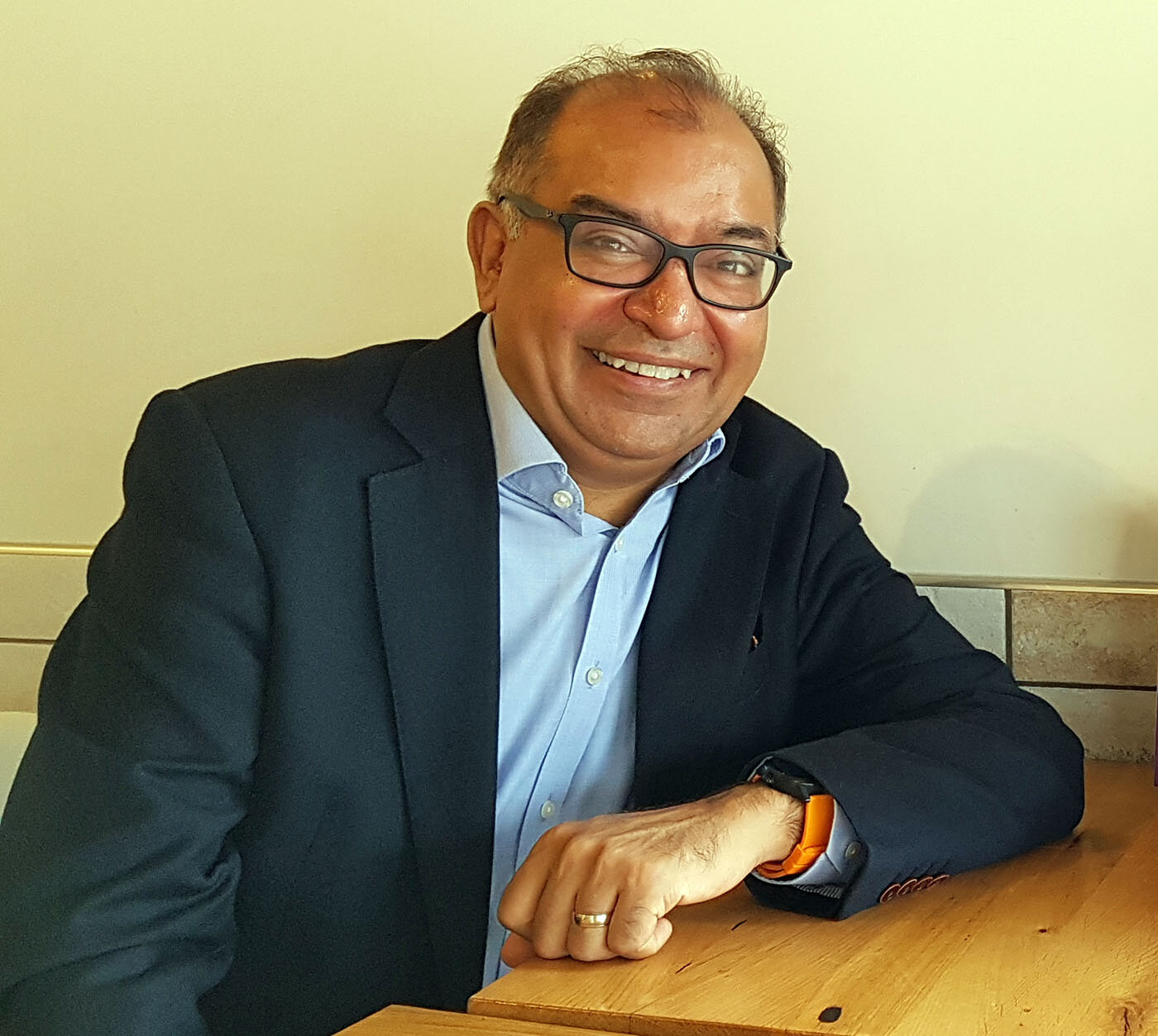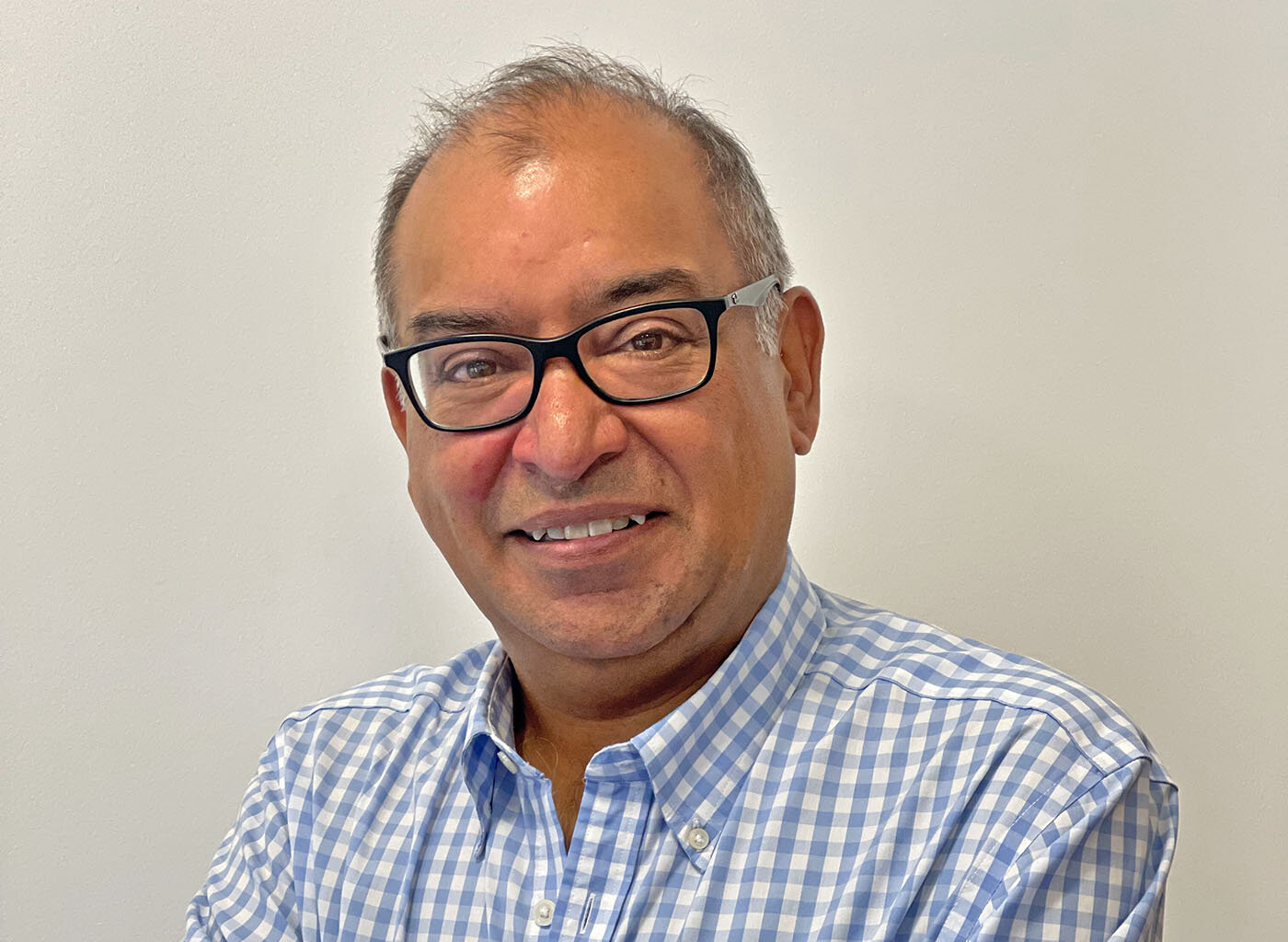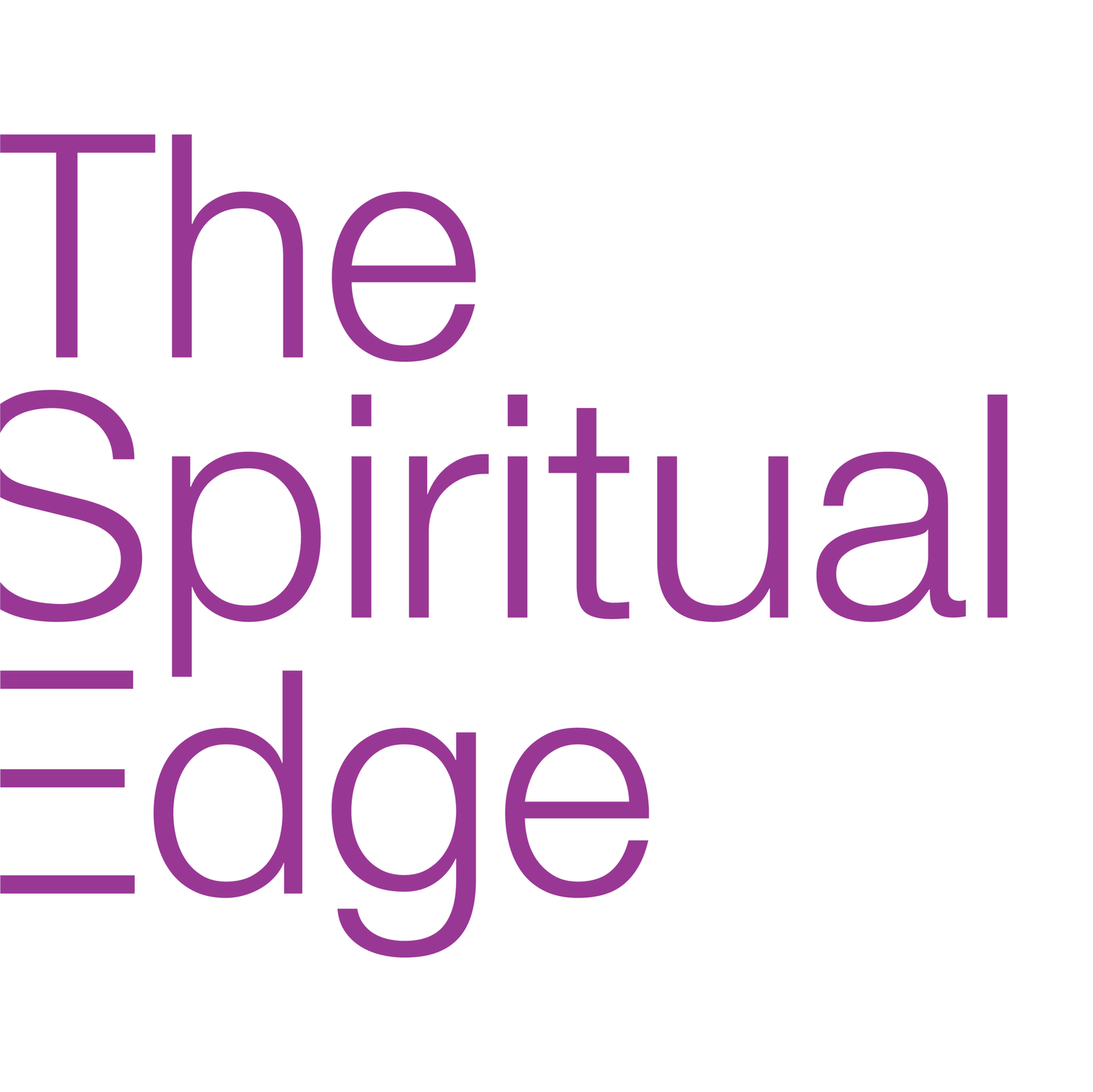A Jain tech innovator combines a religious and global perspective
Mehool Sanghrajka is a leader in the Jain community and the CEO of a social enterprise that focuses on improving the life chances for children through technology.


Listen and subscribe to The Spiritual Edge wherever you listen to podcasts - Apple Podcasts, Spotify, Google Podcasts.
By Athar Ahmad
I’m sitting in a small, cosy cafe in a quiet part of West London on a cold, wet, typically English Monday morning.
The other shops near here — the generic franchises, faceless drive-thrus and big stores — blend into the background. But the cafe I’m in stands out. Starting with its name – Ahimsa.
“Ahimsa means non-violence in Sanskrit, the inspiration behind opening this café”, Ratchri, one of the managers who runs the cafe tells me.
“It’s a very big part of the Jain religion, Ahimsa. We’re basically here to eliminate animal suffering and also Ahimsa means non-violence in thought, word and action, so everyone is welcome. We do get a lot of Jain people coming here”, she adds.
Like Ratchri tells me, protection for all forms of life, from the largest mammals to the smallest bacteria is at the heart of Jainism's ethos. And so everything on the menu at the Ahimsa cafe is 100% vegan - no meat, dairy or animal produce at all.
Compared to other faiths, Jains are small in number — the last census in 2011 estimated the number in the UK to be around 20,000, though community leaders believe the actual figure is almost three times as many. More on that later.
I’m at this cafe to meet one of the most prominent Jains in the UK: Mehool Sanghrajka. He was made an MBE — a Member of the British Empire — by the UK government and Queen.
It’s an honor given to recognize outstanding contribution made to civic life. In Mehool’s case, it’s for his public service as a Jain and his work in education.
I’m also here to enjoy breakfast.
“We’ve got scrambled tofu, sausages, beans, spinach, tomatoes, mushrooms and toast. This is a full English breakfast except it’s 100% vegan”, Mehool says, telling me he comes to the cafe on a weekly basis.
Mehool is as British as this, even as his background placed him in distant regions of the Commonwealth.
“I'm Gujrati Indian. In terms of heritage by birth, I'm an African. I was born in Kenya and I've lived almost 50 years in the UK. So I understand all of those identities. I recognize all of those.”
Along with his leadership in the Jain community, Mehool’s also the CEO of a social enterprise that focuses on improving the life chances for children through digital technology.
Technology expands humans’ reach and that’s why Mehool has decided to pursue it. He believes education is the best way to get people out of poverty. That may be an end, but the means are tied to his faith.
Mehool is the kind of guy who gets involved in lots of different things. But at the root of his motivations are his Jain community and a desire to help people rise above their circumstances.
“It gives me identity. It gives me a sense of purpose, a sense of being, but also a sense of who I am, because it largely defines, you know, my vision of right and wrong. What I see the purpose of this life as being and also it's gone on to define my work and my attitude towards both my community and the people around me”, Mehool says.
“I mean, you know, it doesn't matter what profession I’m in. I mean, it doesn't matter where I live. Those things will change. But this identity, you know, it's something I've grown up with and it's never going to change.”
Jainism isn’t listed in the UK census alongside other major world faiths as there isn’t considered to be a large enough community in the UK. So there’s no formal recognition for this ancient religion which underpins everything Mehool does.
It means there’s no way to know exactly how many Jains there are in the UK or the size of the community. The UK census takes place every 10 years.
“I think the census is therefore, you know, clearly lagging behind, clearly not doing what it needs to. And I think it's a matter of time. I think it's put us at the forefront of the debate. You know, the government knows who we are. The Office of National Statistics knows who we are. It's been in parliament.
I think the contradiction, the impact of the contradiction for us, though, is very profound. And part of the reason is if you look at who else is in the ‘other’ section, it is those who don’t believe in any faith and so on. So it's never taken seriously. So, you know, we are the largest religion in the ‘other’ section, but we're ignored because we're not in the main section. And therefore, you know, it has a huge consequence which takes years to correct because the census only comes around every 10 years.”
Mehool has been actively campaigning to get Jainism added to the list of recognized religions.
“Jainism is so much about an attitude and a way of life and an identity that you're proud of. Now, most Jains historically have shied away from saying that they’re Jain simply because the next question is, who are they?
And so they now need to have some understanding of Jain history and which most of them, you know, perhaps don’t. So they've shied away from that. And what we want to do by putting it on the census is basically, you know, make it something people wear with pride.”
Mehool and I met for breakfast before the coronavirus pandemic hit. COVID-19 has added a degree of difficulty to the many priorities Mehool has had to juggle.
Maintaining the ability for Jains in the UK to practice their faith during the pandemic — at home and as a community — became one of Mehool’s major goals.
When they couldn’t perform religious rites and rituals in person like they usually would, Mehool and his wife Arshana helped the community concentrate on what’s within their control and what isn’t.
Mehool’s helped to foster this through organising lectures, prayer sessions and even yoga classes like this one over Zoom, ensuring his small, close-knit community — many of whom are elderly — aren’t left isolated.
“So, one thing is to spend time effectively, reading, contemplating, meditation and so on. Now that you're stuck in one place using technology, visiting temples remotely in India is possible, listening to sermons is possible, looking at prayer that's going on in other places is possible and so, I think it's actually opened the horizons and you know, made this far more meaningful,” Mehool says.
And his wife Arshana agrees.
“I think it's also brought a lot of people together because realistically when you're in prayer in a temple on your own, it is a solitary practice, whereas now people are actually inviting a whole Zoom community into their home whilst they're in prayer.
So for example, where you'd go to a temple and actually do temple worship, rituals like anointing the statue on your own, you now have one person in their home doing it and an entire Zoom community linked in watching. Religion and ritual became much more accessible.”
Like Hindus and Buddhists, Jains like Mehool believe in reincarnation and seek to attain ultimate liberation — which means escaping the continuous cycle of birth, death and rebirth — so the immortal soul lives forever in a state of bliss. Jains achieve liberation by eliminating all karma from the soul.
Before COVID-19, Mehool spent less time in his office than in far-flung parts of the world. Jain concepts shape his approach to business, philanthropy and helping those beyond his own faith.
Though he’s been helping serve the needs of his own community during the pandemic, Mehool’s also worked hard to extend his support and leadership to people beyond it.
Before and during the pandemic, he’s focused this leadership on the field of distance learning.
“What we did very early on, is that we put a model together with Microsoft to say we would provide our technology for free for a period of time. You know we're potentially looking at over a million kids coming onto that platform which I think will be tremendous,” Mehool proudly tells me.
A while ago, Mehool’s desire to give children around the world opportunities for education led him to reach out to other tech leaders within his network.
More than a quarter century ago, with those who bought into his excitement and vision, he began brainstorming the possibilities of expanding learning beyond the traditional classroom.
“To go out into areas where the internet isn't always there, that children don't have basic desks and books and the kind of things you take for granted, sometimes they don't have teachers. Sometimes they're in scenarios where coming to school is a big problem because of the challenges of their home life. You know, improving their wellbeing is hugely satisfying,” Mehool says.
The reach of Mehool’s organization — Learning Possibilities — now expands as far as India and the Philippines.
“Many, many years ago, we decided to become a social enterprise, which for us actually means that we focus massively on the impact we create, not just the financial results we generate. And therefore, we're heavily focused on this idea of impact and of improving lives.”
The principle of karma — and his continual quest to eliminate it — underpins Mehool’s ongoing effort to expand the reach of his social enterprise.
“Ignorance is the cause of most misery. And so the opposite of that is education. And so, you know, for me, it's something that I think you do once to a child, but will have a lifelong impact. And that is part of my religion and providing knowledge to kids is what I'm very comfortable doing as a Jain, because it’s a strong basis in my belief,” Mehool says.
He adds, ‘ultimately, I don't think there is anything you can really achieve alone. You know, as Jains, we learn at an early age that life is interdependent. Nothing is going to happen without the goodwill of the many. And without their support, this journey would have ended a long time ago.”
Mehool’s workload has increased massively since the pandemic, with more demand — and need — for remote learning everywhere. It’s meant he’s balancing his responsibilities in keeping the Jain community in the UK connected and empowering children through education.
He’s now talking with education officials in eight countries he hadn’t communicated with before in order to find ways to overcome lockdown.
Mehool had spent years trying to convince skeptics that remote learning technology was a feasible way to create educational opportunities for those most in need.
“It's really sad that it takes a pandemic for people to open their eyes and see this. Because we've been talking about this since the late 90s. If you look at how long I've been doing this, I think it's now come to 25 years and if I'm honest, you know, it's been quite a tough 25 years.
I think there comes a time which gives you the golden opportunity and whether it's the universe, whether it's karma, whether it's God, this is the point at which everything we've said up to now is starting to come through. From a faith perspective it's a huge reward and that therefore keeps you engaged and keeps you driving and fighting the hurdles and overcoming them.”
Mehool has to maintain a constant juggling act: Balancing his deep-rooted commitment to providing education through technology during the global pandemic, while ensuring his community of Jains in the UK aren’t neglected, continuing to learn, grow and understand more about their faith.
Mehool will continue to support and champion the Jain community, while ensuring education through remote learning reaches as many children around the world as possible.
Family worship at home has become a regular practice. But how else has the pandemic affected Mehool and his wife Arshana’s family life?
“It’s an opportunity for us to go on long walks, eat together, you know we've survived and I think it's again, because we through our religion and our belief, have a lot of integrity, have a lot of things in common”, Mehool says.
Arshana adds, “we've had so many more dinner table debates over various concepts or you know, if someone's having a difficult time with something, we've talked about it a lot more openly and drawn on different things to understand each other's points of view. It's been finding happiness in simple things.”
Mehool says the pandemic has brought the essence of his faith to the forefront, leaving what he hopes will be a lasting legacy for him, the Jain community and society at large.
“Look at how many people have started to look at a vegetarian or vegan diet, look at the way that people are looking after animals or treating animals. And also, this drive to eradicate poverty, all of these things I think are an awakening, because what we see today is the consequences of that. It's almost as if God has kind of, you know, sent us to our rooms, to learn our lesson before we can come out again.”
***
Athar Ahmad is a reporter and documentary maker with the BBC.
The Sacred Steps series is a collaboration between KALW’s The Spiritual Edge and the USC Center for Religion and Civic Culture. Funding comes from the John Templeton Foundation and the Templeton Religion Trust.
